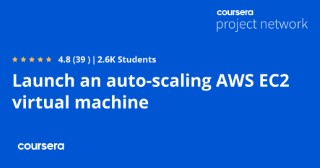Introduction to Cloud Computing
Get started in Cloud Computing with this beginner-friendly, self-paced course! Gain foundational knowledge and hands-on experience in cloud computing, including key components, service and deployment models, emergent trends, and security. Suitable for executives, managers, students, or anyone looking to start a career as a cloud practitioner. Enroll now!
Get started in Cloud Computing with this beginner friendly, self-paced course! You will gain the foundational knowledge required for understanding cloud computing from a business perspective and also as a cloud practitioner.
In this course, you’ll be introduced to some of the prominent cloud service providers of our times (e.g. AWS, Google, IBM, Microsoft, etc.) the services they offer, and look at some case studies of cloud computing across industry verticals. You’ll also be introduced to Cloud Adoption, and some related technologies such as Blockchain & Analytics and AI.
You will learn about the various cloud service models (IaaS, PaaS, SaaS) and deployment models (Public, Private, Hybrid) and the key components of a cloud infrastructure (VMs, Networking, Storage – File, Block, Object, CDN). We also cover emergent cloud trends and practices including – Hybrid Multicloud, Microservices, Serverless, DevOps, Cloud Native and Application Modernization. You will also learn the basics of cloud security, monitoring, as well as different job roles in the cloud industry.
By the end of the course, you will have created your own account on IBM Cloud and gained some hands-on experience by completing a final assignment that will be a great addition to your portfolio!
This course is suitable for a variety of audiences – whether you are an executive / manager / student who wants to become familiar with cloud computing terminology and concepts, or someone who wants foundational grounding in cloud computing to start a career in this field or become a cloud practitioner – such as a cloud engineer, full stack developer, devops engineer, SRE, cybersecurity analyst, etc.
What you will learn
Overview of Cloud Computing
This week you will learn about the definition and essential characteristics of cloud computing. You will learn about the evolution of cloud computing, the emerging technologies supported by cloud, and the business case for cloud computing.In this module, you will learn about the definition and essential characteristics of cloud computing. You will also learn about the evolution of cloud computing, the business case for cloud adoption, and how some of the emerging technologies are being supported by cloud computing.
Cloud Computing Models
This week you will learn about the different types of service and deployment models of cloud computing. In this module, you will learn about the three main service models available on the cloud—Infrastructure-as-a-Service (IaaS), Platform-as-a-Service (PaaS), and Software-as-a-Service (SaaS). You will also learn about the three main deployment models available on the cloud—Public, Private, and Hybrid. At the end of the module, you will create an account on IBM Cloud.
Components of Cloud Computing
This week you will learn about the various components of a cloud computing architecture, such as virtualization virtual machines, bare metal servers, and the difference between virtual machines and bare metal servers. You will learn how to build a secure cloud networking presence, how container-based technologies work, and the benefits of a Content Delivery Network. We will also familiarize you with the four main types of cloud storage.
Emergent Trends and Practices
This week you will learn about some of the emergent trends in cloud computing, such as Hybrid Multicloud, Serverless Computing, and Microservices. You will also learn about how cloud native applications work, the role of DevOps in addressing some of the complexities of cloud computing, and the components of application modernization.
User Reviews
Be the first to review “Introduction to Cloud Computing”
You must be logged in to post a review.







There are no reviews yet.